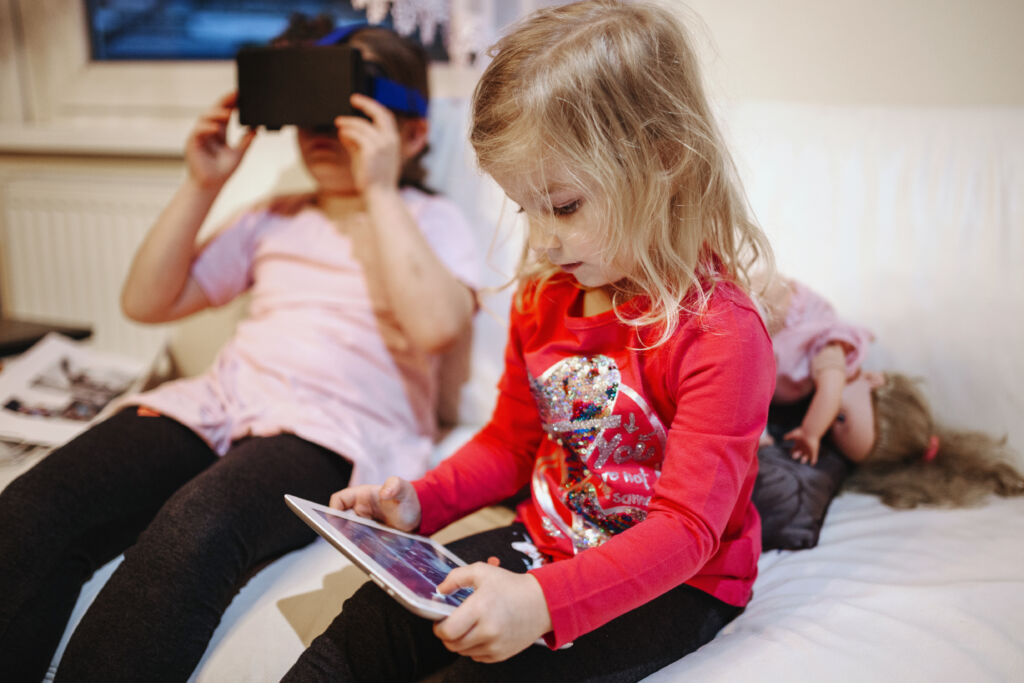Tech gifts can introduce digital skills which are foundational to STEM.
KEY POINTS
- Technology from iPhones to Nintendo Switch tops kids’ holiday wishlists.
- COVID has changed kids’ expectations about digital devices—not to mention their parents’.
- Lots of tech toys teach digital skills, like critical thinking and collaboration.
- Digital skills are foundational to STEM skills and are a minimum standard for most careers.
 From an iPhone to Nintendo Switch, a tablet to a smartwatch, what’s on your kid’s wish list? How can you make sense out of what tech experiences are positive? How do you match technology choices with your kid’s maturity?
From an iPhone to Nintendo Switch, a tablet to a smartwatch, what’s on your kid’s wish list? How can you make sense out of what tech experiences are positive? How do you match technology choices with your kid’s maturity?
After over a year of COVID, our perception of technology has changed. It’s gone from being parent enemy number one to a lifeline. With news stories about the Facebook files and the irresponsible use of the term “addiction” without regard for diagnostic criteria, you may be trying to figure out what makes sense for your kids today. But trust me, getting kids off their devices is going to be a much harder sell than ever before.
Embedded technology is the new normal.
When you’re 11, two years of COVID represents about 20 percent of your life. That’s a lot in terms of a child’s experience and frame of reference. But more importantly, it’s a significant difference in the child’s cognitive, emotional, and social development. We adults may be a little road-weary from the pandemic. Our kids are entirely different people.
Technology has been the lifeline for young people whose developmental tasks are outward-focused and rely on social interaction with peers. You may think it’s time to get back to normal and “rein in all that screentime,” but your idea of normal will probably not match up with that of your kids. For them, life flows from offline to on and back again; technology is integrated more than ever in their new normal. So don’t be shocked if even very young kids ask for tech this holiday. Cellphones may be at the top of the wish list this year precisely because they are multi-function devices and not just a portal to Instagram.
The benefits and risks of cellphones for kids:
There are lots of ways to evaluate a child’s readiness for a cellphone and connected technologies. The first is to start a conversation with your child where both of you identify how you see the benefits and the risks. I guarantee that your lists of pros and cons won’t match your child’s.
This is valuable information for crafting responsible use agreements. But you may be surprised at how both your and their ideas and expectations have changed post-pandemic.
But tech gifts aren’t just about cellphones. The increased use of phones, tablets, and computers means kids have a lot more familiarity with all kinds of things that digital devices can do, from moviemaking, drawing, and video games to apps like Headspace to address anxiety. (Yes, believe it or not, kids are asking for Headspace subscriptions.)
Introduce digital skills.
Broader experience also means kids will be more interested in learning about how to make digital experiences themselves. Why do you think TikTok is so popular?
 This makes the holidays a perfect opportunity to introduce your child to some gifts that will further expand their interest in technology and develop their skills, as well as help prepare them for more career opportunities. According to 2017 research funded by Capital One, 82 percent of middle-level jobs require digital skills, and jobs requiring advanced digital skills pay twice as much (Bradley & Restuccia, 2017). Digital skills and digital literacy have become a minimum standard for career opportunities. Yet less than half of all school programs integrate any form of computer science or digital skills training.
This makes the holidays a perfect opportunity to introduce your child to some gifts that will further expand their interest in technology and develop their skills, as well as help prepare them for more career opportunities. According to 2017 research funded by Capital One, 82 percent of middle-level jobs require digital skills, and jobs requiring advanced digital skills pay twice as much (Bradley & Restuccia, 2017). Digital skills and digital literacy have become a minimum standard for career opportunities. Yet less than half of all school programs integrate any form of computer science or digital skills training.
Research also shows that students need a foundation in digital skills to succeed in STEM subjects (science, technology, engineering, and math). STEM education is increasingly important because the growth of STEM careers will far outpace non-STEM ones. STEM education helps all students, not just future engineers. It emphasizes the same foundation as media and digital literacy—critical thinking. Critical thinking enhances problem-solving, creativity, the ability to question, find and evaluate information, to understand how the world works, and collaboration.
Make STEM skills relevant.
Your child may “hate math and science,” as some of mine did, but talk to them about making a video, creating a soundtrack, building a Minecraft mod, negotiating a trade for a rare, legendary pet in Roblox, or even figuring out the value of likes and followers on YouTube, and you will see their eyes light up. Now that’s useful stuff from their perspective! And all of these are based on digital skills and most on what we’d consider STEM.
Look for ways to expand your kids’ appreciation of technology and increase their skills by giving them more ownership over the skills. Robots that draw what you program or LED lights a teen can program to pulse with their favorite tunes on Spotify (another big holiday ask). And don’t underestimate the humble mobile phone. You may be worried about scrolling on Instagram, but kids are using their phones for everything from research to movie making.
Self-esteem is a function of self-evaluation (e.g., Baumeister et al., 2003). Technology is not going away. Peer-to-peer connectivity is here to stay, no matter what happens with Facebook. Using technology for skills development can contribute to successes and competencies that enhance self-confidence and emphasize intrinsic value, mitigating the potential negative effects of social comparison that plague growing up.
References
Baumeister, R. F., Campbell, J. D., Krueger, J. I., & Vohs, K. D. (2003). Does High Self-Esteem Cause Better Performance, Interpersonal Success, Happiness, or Healthier Lifestyles? Psychological Science in the Public Interest, 4(1), 1–44. https://doi.org/10.1111/1529-1006.01431
Bradley, B. & Restuccia, D. (2017). The Digital Edge: Middle-Skill Workers and Careers. Burning Glass Technologies/Capital One
Join Over 7,500 Fielding Alumni Located Around The World!
Change the world. Start with yours.™






Get Social